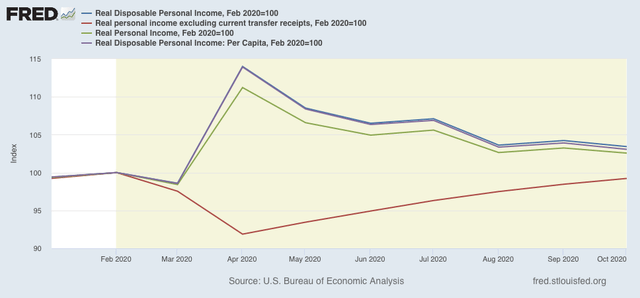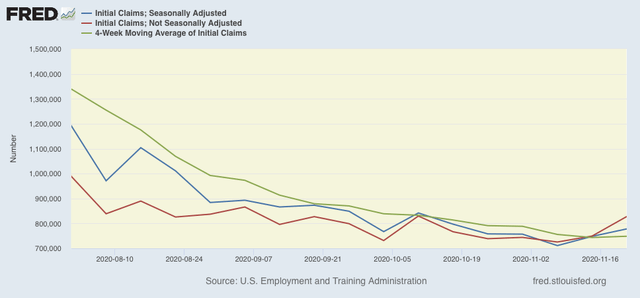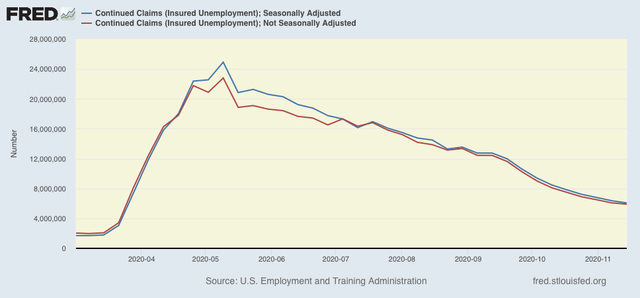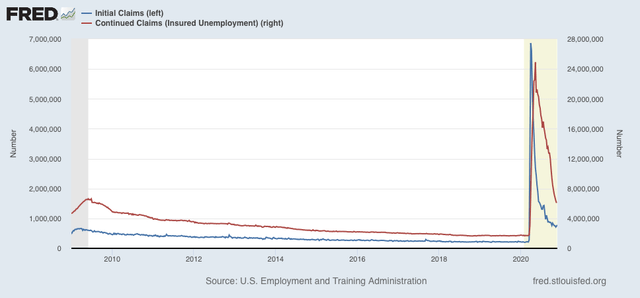- by New Deal democrat
John Locke’s “Second Treatise of Government,” published in 1690 just after and in support of the Glorious Revolution, is the founding philosophical document of modern liberal representative democracies.
In it he anticipates John Rawls’s “original position.” Locke argues that, in order to protect their property, over time all groups of humanity form “civil societies” by agreeing *in advance* to rules that will be applied to public and private controversies, civil and criminal; and by establishing a legislature which will make further laws - again, *in advance* - to govern new controversies which may arise.
The essence of this argument is found in Sections 87, 88, 89, 94, 124, 131, and 142, which I have abridged below (advance warning: Locke writes in *extremely* long and convoluted sentences!)(bold emphasis is mine):
Sect. 87. ... [B]ecause no political society can be, nor subsist, without having in itself the power to preserve the property, and in order thereunto, punish the offences of all those of that society; there, and there only is political society, where every one of the members hath quitted this natural power, resigned it up into the hands of the community in all cases that exclude him not from appealing for protection to the law established by it. And thus ... the community comes to be umpire, by settled standing rules, indifferent, and the same to all parties; and by men having authority from the community, for the execution of those rules, decides all the differences that may happen between any members of that society concerning any matter of right; and punishes those offences which any member hath committed against the society, with such penalties as the law has established ....
Sect. 88. And thus the commonwealth comes by a power to set down what punishment shall belong to the several transgressions which they think worthy of it, committed amongst the members of that society, (which is the power of making laws) ... and all this for the preservation of the property of all the members of that society, as far as is possible. ... [E]very man who has entered into civil society ... has given up to the legislative in all cases, where he can appeal to the magistrate, he has given a right to the commonwealth to employ his force, for the execution of the judgments of the commonwealth .... And herein we have the original of the legislative and executive power of civil society, which is to judge by standing laws, how far offences are to be punished, when committed within the commonwealth; and also to determine, by occasional judgments founded on the present circumstances of the fact, how far injuries from without are to be vindicated; and in both these to employ all the force of all the members, when there shall be need.
Sect. 89. Where-ever therefore any number of men are so united into one society, as to quit every one his executive power of the law of nature, and to resign it to the public, there and there only is a political, or civil society. And this is done, where-ever any number of men, in the state of nature, enter into society to make one people, one body politic, under one supreme government; or else when any one joins himself to, and incorporates with any government already made: for hereby he authorizes the society, or which is all one, the legislative thereof, to make laws for him, as the public good of the society shall require; to the execution whereof, his own assistance (as to his own decrees) is due. And this puts men out of a state of nature into that of a commonwealth, by setting up a judge on earth, with authority to determine all the controversies, and redress the injuries that may happen to any member of the commonwealth; which judge is the legislative, or magistrates appointed by it. And where-ever there are any number of men, however associated, that have no such decisive power to appeal to, there they are still in the state of nature.
Sect. 94. ... [Y]et [over] time, ... the people finding the[y] ... could never be safe nor at rest, nor think themselves in civil society, till the legislature was placed in collective bodies of men, call them senate, parliament, or what you please. By which means every single person became subject, equally with other the meanest men, to those laws, which he himself, as part of the legislative, had established; nor could any one, by his own authority; avoid the force of the law, when once made; nor by any pretence of superiority plead exemption, thereby to license his own, or the miscarriages of any of his dependents. No man in civil society can be exempted from the laws of it ....
Sect. 124. The great and chief end, therefore, of men's uniting into commonwealths, and putting themselves under government, is .. [t]here [must be] an established, settled, known law, received and allowed by common consent to be the standard of right and wrong, and the common measure to decide all controversies between them: for though the law of nature be plain and intelligible to all rational creatures;
Sect. 131. ... [M]en, when they enter into society, ... it being only with an intention in every one the better to preserve himself, his liberty and property; (for no rational creature can be supposed to change his condition with an intention to be worse) the power of the society, or legislative constituted by them, ... is obliged to secure every one's property, by providing [that] ... whoever has the legislative or supreme power of any commonwealth, is bound to govern by established standing laws, promulgated and known to the people, and not by extemporary decrees ....
Sect. 142. [T]he bounds ... to the legislative power of every commonwealth, in all forms of government [are] [f]irst, [that] they are to govern by promulgated established laws, not to be varied in particular cases, but to have one rule for rich and poor, for the favourite at court, and the country man at plough.
Note further that Locke writes that magistrates (a combined Executive/Judicial power - remember the independent judiciary is a modern concept dating from the UK just after the Glorious Revolution) are to simply enforce those standing laws in particular cases. This is exactly the position taken by Alexander Hamilton in Federalist Papers numbers 78 and 81 as to how he envisioned the US Supreme Court and inferior Courts were to function, including being bound by pre-existing precedent.
Put simply, the ad hoc creation of retroactive new rules after the fact is fundamentally inconsistent with liberal democracy. This is why what Trump is attempting is a coup.
According to Article II, Section 1, Clause 3 of the Constitution, Congress “may determine the Time of chusing the Electors, and the Day on which they shall give their Votes.”
Congress set Election Day as November 3. If this is “the Time of chusing the Electors” under the above Clause, then there is no legislative power for a retroactive change.
But of course, that could ultimately be a controversy in which the Supreme Court might weigh in. If one could be confident that this Supreme Court would consider itself bound by precedent, that might not be a significant worry. But in the last two years alone this Supreme Court has overturned 8 precedents that were at least 30 years old.
To put it bluntly, allowing legislatures to intervene and set aside the result of an election that the majority of legislators did not like would be a fundamental offense against the foundational requirements of a civil society. That there is substantial doubt that legislatures and the US Supreme Court will uphold those foundational requirements is a warning siren about the condition of the US as a Republic operated by representative democracy.



